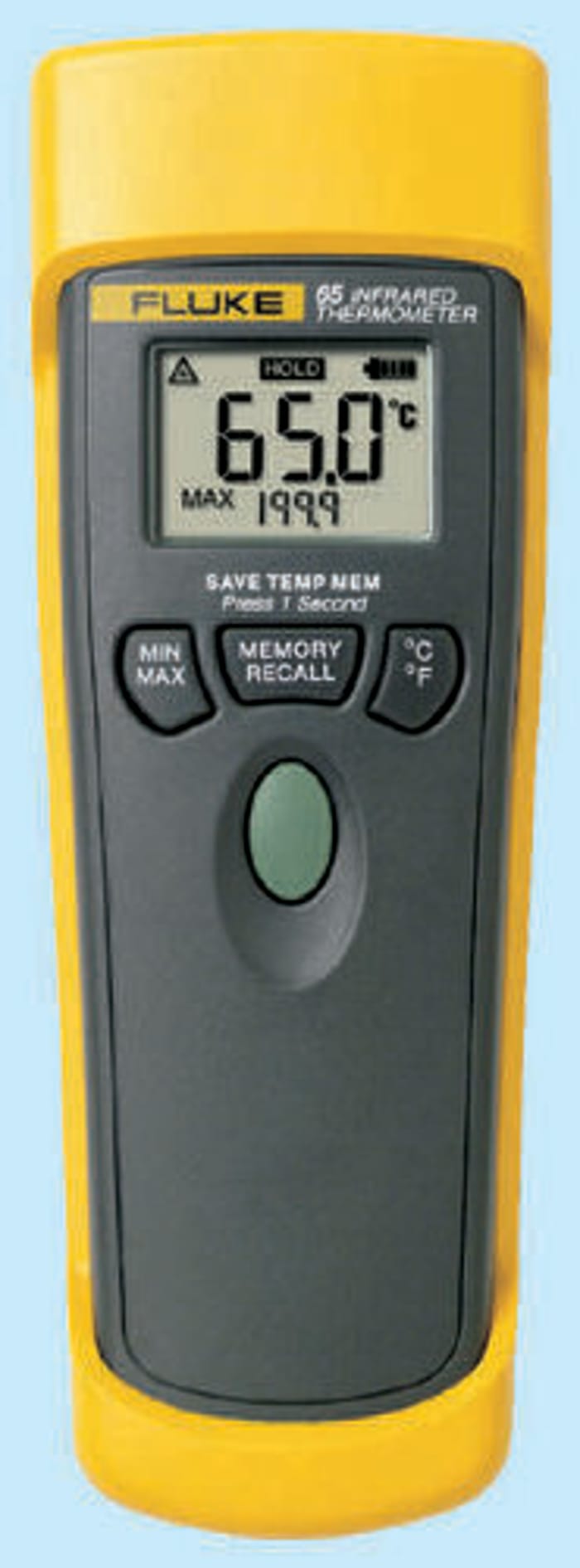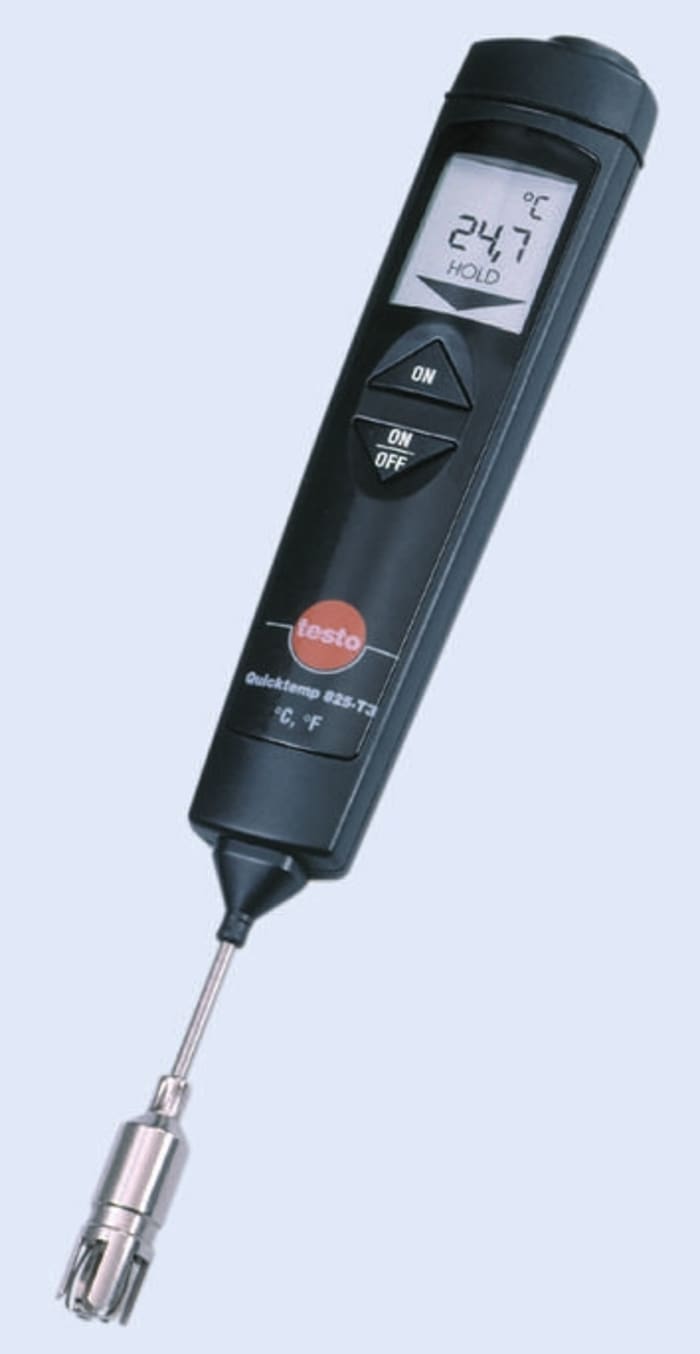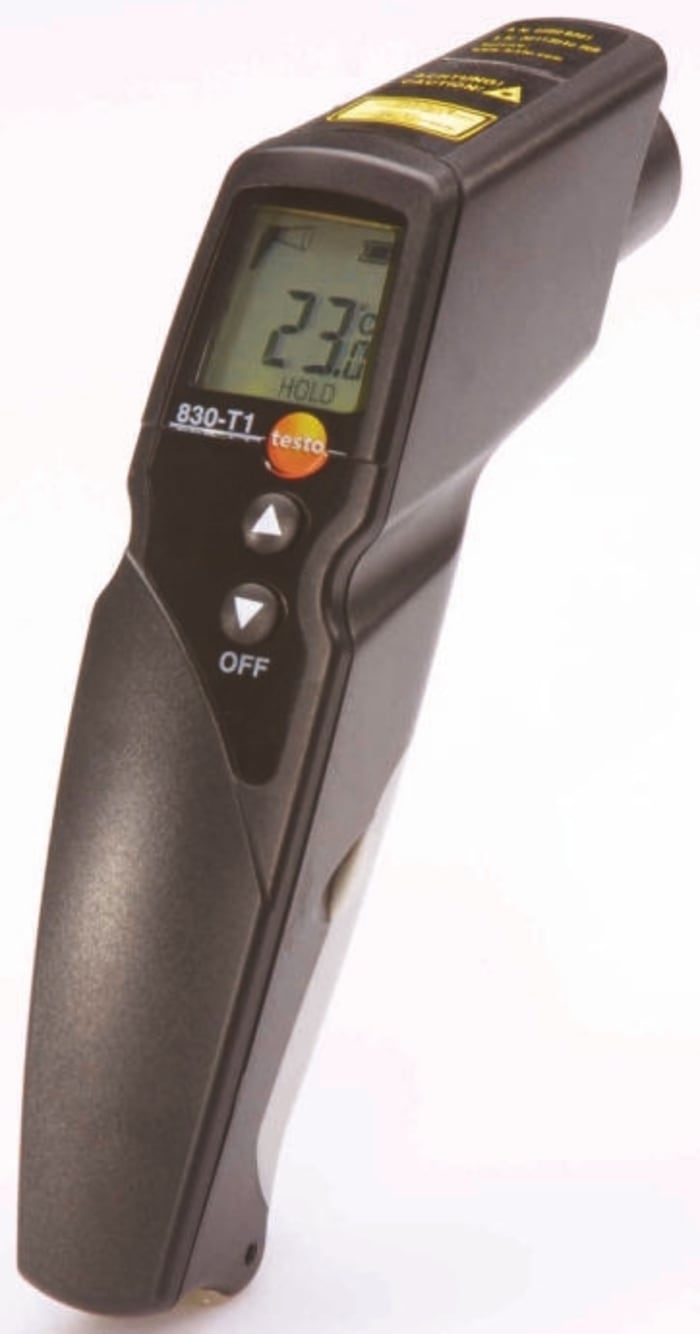Technical Document
Specifications
Brand
FlukeAbsolute Maximum Temperature Measurement
+550°C
Temperature Scale
Centigrade, Fahrenheit
Absolute Minimum Temperature Measurement
-40°C
Best Accuracy
±1 %
Distance to spot Ratio
12:1
Emissivity
Adjustable
Model Number p
561
Model Number (p)
561
Resolution
0.1 °C
Response Time
500 ms
Length
254mm
Width
191mm
Height
69mm
Weight
340g
Country of Origin
China
Product details
Fluke 561 IR and Contact Thermometer
Designed for the HVAC/R Engineer or Technician the Fluke 561 IR and contact thermometer, combines the temperature measurement functions that industrial, electrical, and HVAC/R professionals need, all in one tool. It measures both infrared and contact temperature, replacing several other test tools. It’s fast, efficient, and easy to use, saving you valuable time and effort. With the Fluke 561 infrared thermometer, you can also take contact and ambient temperatures in the way that’s best for you. Use the non-contact laser thermometer to measure hot, moving, electrically energized, and hard-to-reach objects instantly. Check motors, insulation, breakers, radiant heating, pipes, corroded connections, and wires. Plus, scan ducts, and other hard-to-reach objects from the floor-leave your ladder in the truck. You can use the Fluke 561’s handy flexible pipe probe, or plug in any industry standard type K mini connector thermocouple probe you already own to take super-heat or internal temperatures.
Features and Benefits:
• Two in one thermometer IR and K Type thermocouple
• Velcro pipe probe included
• Laser sighting
• LCD backlit display
• 3 Step emissivity adjustment (Low Medium & High)
• Lightweight and Robust
• Min, Max and Diff measurement function
• Temperature Range -40 to 550C
• Distance to spot size 12:1
• Accuracy +/- 1% of reading or +/-1Deg C. Below 0 +/- 1 Deg C +/- 0.1Deg/1Deg C
• Compatible with standard K type probes
• Includes applications guide and carry case
How accurate are infrared thermometers?
The majority of IR thermometers have a measurement error specification, which shows their best accuracy. The surface being measured can also affect accuracy. Reflective objects result in lower measurements than the actual temperature, whilst non-reflective surfaces give higher measurement. The emissivity of a surface is how effective it is at emitting energy as thermal radiation, as such some IR thermometers have adjustable emissivity settings.
Distance to spot ratio is also essential in providing accurate temperature measurements, if an infrared thermometer is too close to its target area, heat can build up in the device. This can give false readings or damage the temperature sensors, therefore it is essential to always follow a manufacturers guidelines.
Stock information temporarily unavailable.
Please check again later.
P.O.A.
Calibration type
No Calibration
1
P.O.A.
Calibration type
No Calibration
1
Technical Document
Specifications
Brand
FlukeAbsolute Maximum Temperature Measurement
+550°C
Temperature Scale
Centigrade, Fahrenheit
Absolute Minimum Temperature Measurement
-40°C
Best Accuracy
±1 %
Distance to spot Ratio
12:1
Emissivity
Adjustable
Model Number p
561
Model Number (p)
561
Resolution
0.1 °C
Response Time
500 ms
Length
254mm
Width
191mm
Height
69mm
Weight
340g
Country of Origin
China
Product details
Fluke 561 IR and Contact Thermometer
Designed for the HVAC/R Engineer or Technician the Fluke 561 IR and contact thermometer, combines the temperature measurement functions that industrial, electrical, and HVAC/R professionals need, all in one tool. It measures both infrared and contact temperature, replacing several other test tools. It’s fast, efficient, and easy to use, saving you valuable time and effort. With the Fluke 561 infrared thermometer, you can also take contact and ambient temperatures in the way that’s best for you. Use the non-contact laser thermometer to measure hot, moving, electrically energized, and hard-to-reach objects instantly. Check motors, insulation, breakers, radiant heating, pipes, corroded connections, and wires. Plus, scan ducts, and other hard-to-reach objects from the floor-leave your ladder in the truck. You can use the Fluke 561’s handy flexible pipe probe, or plug in any industry standard type K mini connector thermocouple probe you already own to take super-heat or internal temperatures.
Features and Benefits:
• Two in one thermometer IR and K Type thermocouple
• Velcro pipe probe included
• Laser sighting
• LCD backlit display
• 3 Step emissivity adjustment (Low Medium & High)
• Lightweight and Robust
• Min, Max and Diff measurement function
• Temperature Range -40 to 550C
• Distance to spot size 12:1
• Accuracy +/- 1% of reading or +/-1Deg C. Below 0 +/- 1 Deg C +/- 0.1Deg/1Deg C
• Compatible with standard K type probes
• Includes applications guide and carry case
How accurate are infrared thermometers?
The majority of IR thermometers have a measurement error specification, which shows their best accuracy. The surface being measured can also affect accuracy. Reflective objects result in lower measurements than the actual temperature, whilst non-reflective surfaces give higher measurement. The emissivity of a surface is how effective it is at emitting energy as thermal radiation, as such some IR thermometers have adjustable emissivity settings.
Distance to spot ratio is also essential in providing accurate temperature measurements, if an infrared thermometer is too close to its target area, heat can build up in the device. This can give false readings or damage the temperature sensors, therefore it is essential to always follow a manufacturers guidelines.




